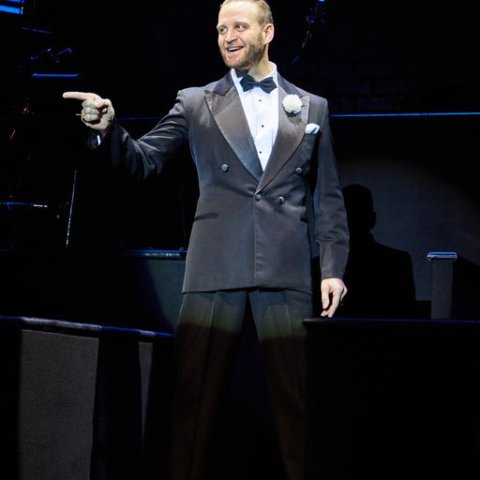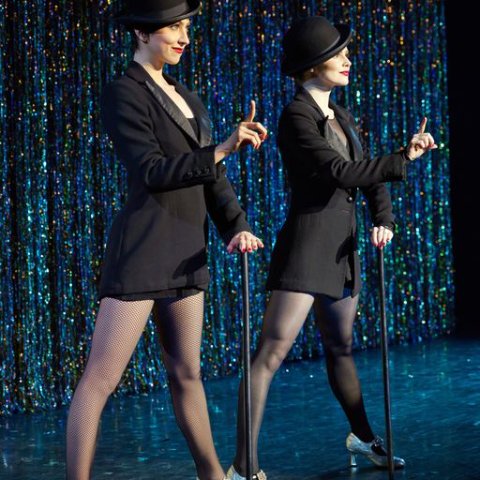Chicago the Musical
Non-equity Tour in Ft. Lauderdale
By: Aaron Krause - Feb 16, 2023
During the age of Donald J. Trump, “Fake News,” “Alternative Facts,” and George Santos, the musical Chicago seems torn from today’s headlines. Indeed, although the show takes place in the Windy City during the 1920’s, it feels contemporary and timely in 2023.
Of course, you could experience the show in New York, where the 1996 Broadway revival is still running strong. However, you could also see Chicago in Ft. Lauderdale. There, a mostly solid non-equity national touring production runs through Sunday at the Broward Center for the Performing Arts.
Chicago is the longest running American musical in Broadway history, and it is easy to see why. The show’s seductive and sexy quality still captivates through memorable music, drama, high-octane dancing, as well as colorful characters. Also, never underestimate the fun of watching adults behave badly. Rest assured, the adult characters do just that in this salacious and irresistible tale.
Chicago is a satiric show about power, lies, money, corruption, and celebrity. Sound familiar?
More specifically, the musical satirizes corruption in the administration of criminal justice, sensational journalism, and the concept of the “Celebrity Criminal.”
For the uninitiated, Chicago tells the story of murder suspects Roxy Hart and Velma Kelly during the 1920’s in the Windy City. The show’s basis is a 1926 play with the same title by real-life Chicago journalist Maurine Dallas Watkins. In fact, actual criminals and the crimes on which Watkins reported inspired her to pen the play.
In Chicago, Hart is a housewife and nightclub dancer. She maliciously murders her on-the-side lover after he threatens to walk out on her.
Desperate to avoid conviction, Hart dupes the public, the media, and her rival cellmate, Kelly, by hiring Chicago’s slickest, and likely most expensive criminal lawyer, Billy Flynn. It might surprise you how much he charges.
Fortunately for Hart, her attorney believably tells a false, alternative version of what happened. And, spoiler alert, Flynn convinces juries that Hart and Kelly are not guilty. But now that they can walk free, their names are no longer above the fold in the tabloids. Hart, for one, wants her fame back.
One of this production’s weaknesses is that the rivalry between Hart and Kelly could be more palpable. Also, the actors portraying the female criminals could sing more forcefully the song “Cell Block Tango.” The number offers actors the chance to show just how badass these characters are.
With that out of the way, it is easy to admire these triple threat performers. For instance, they seemingly effortlessly execute the physical and sexually suggestive choreography. It includes hip thrusts and arm movements, but it also includes more physical actions such as lifting performers, cartwheels, and spins. Some of the choreography is slow and seductive, while at other times, it is forceful. Both qualities capture the characters’ traits and lend energy to the production.
Gary Chryst re-creates the original production’s choreography by Ann Reinking in the style of the legendary Bob Fosse. And Tania Nardini recreates the production’s original direction by Walter Bobbie. The direction is assured and creative. For example, more than once you will find a performer atop a ladder, allowing that performer's character to stand out.
Generally, the actors, under Nardini’s direction, capture the musical’s bitingly satiric tone. The performers ably act on a nearly bare stage. For instance, during “Cell Block Tango” there are no black bars to suggest that the characters are in jail.
The minimal scenery is part of the show’s Brechtian style. By the way, the term “Brechtian” stems from its namesake, Bertolt Brecht (1898-1956). He was a German theater practitioner, playwright, and poet.
Brecht’s “Epic Theater” style forces us to pay close attention to the issues and themes that a show raises, as opposed to emotionally identifying too closely with the show’s action and its characters. Generally, Brecht’s style does away with the imaginary “Fourth Wall” separating audience members from the pretend world that the characters inhabit. By doing so, Chicago calls attention to itself as a show.
In addition to minimal scenery, Chicago features numerous instances of characters directly addressing the audience. Also, the characters and the live orchestra conductor interact, and sometimes an actor introduces a song before another character sing it.
Speaking of the orchestra, its musicians produce a rich sound while accompanying the actors. They possess powerful, rangy voices, and can hold notes for impressive lengths of time. In addition, the performers convey the emotions behind the songs.
Highlights among the musical numbers include a sensual “All That Jazz,” a triumphant “Roxie,” an upbeat “Me and My Baby, and a fast-paced “We Both Reached for the Gun.”
One of the most comical numbers is the latter song, during which Roxie is her lawyer’s ventriloquist dummy, saying everything he tells her to. Credit the actors for playing such funny moments with sincerity, enhancing the comedy.
For the most part, the actors, illuminated by Ken Billington's mood-enhancing lighting and wearing William Ivey Long's character-appropriate costumes, succeed as ensemble members and as individual performers.
For instance, Logan Floyd captures Velma Kelly’s arrogance and cynicism, and supreme confidence. However, the performer could be more badass at times. Floyd’s Kelly helps set the tone for the show in the beginning by sexily and confidently speaking the opening lines.
Opposite Floyd, Katie Frieden nails Roxy Hart’s ambitious aura and impulsivity. In addition, Frieden makes Roxy vulnerable and nervous enough so that we sympathize with her.
Meanwhile, Christina Wells commands the stage as an unapologetic and frank Matron “Mama” Morton. She is the matron of the Cook County Jail who dishes out favors as long as you are nice to her.
Jeff Brooks is anything but nice as attorney Billy Flynn. Indeed, Brooks injects the attorney with a slick, showy self-assurance, arrogance and a fierce competitiveness.
Contrastingly, Brian Kalinowski lends the hapless Amos Hart an insecure awkwardness, timidity, and vulnerability. The actor also nails his character’s self-deprecating manner and is touching in his character’s wry number, “Mr. Cellophane.” It is a humorous song that may call to mind the more serious number, "Waving Through a Window," in Dear Evan Hansen.
Other cast standouts include G.A. James as a seemingly good-natured Mary Sunshine, a high-powered gossip columnist. As Sunshine, James hits the high notes with clarity and demonstrates impressive vocal control.
In addition to entertaining us, Chicago, like most great theater, forces us to look within ourselves. What are our priorities and values? Do we, like Billy Flynn, solely value money, and are we only out for ourselves? Do we value the truth, or do we also favor alternative truths and facts?
During this divisive time in history, chances are you will laugh and nod especially while listening to the frank and funny song, “Class.” Floyd and Frieden sing it with the right comedic tone. The song’s lyrics include the following.
Whatever happened to fair dealing?
And pure ethics
And nice manners?
Why is it everyone now so a pain in the ass?
Whatever happened to class?
The national, non-equity touring production of Chicago remains in Ft. Lauderdale at the Broward Center for the Performing Arts through Sunday. The address is 201 S.W. 5th Ave. in Ft. Lauderdale. Ticket prices start at $35. For orders for groups of 10 or more, call (954)660-6307. Tickets are available at browardcenter.org, ticketmaster.com, and by phone at (954) 468-0222. You can also go to the Broward Center’s AutoNation Box Office. For more information about this touring production, including future stops, go to Chicago the Musical (chicagoontour.com).


